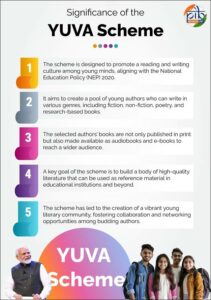Education
PM-YUVA 3.0: Transforming Young Writers in India’s Schools?
The Prime Minister’s Young Authors Mentorship Scheme (PM-YUVA) has returned for its third edition, promising to shape the future of young Indian writers once again. Launched by the Ministry of Education (MoE) and the National Book Trust (NBT) of India on March 11, 2025, YUVA 3.0 seeks to nurture creative talent among individuals under 30, providing them with a structured mentorship programme that equips them with the skills to document India’s past, present, and future through literature.
With themes such as the contribution of the Indian diaspora in nation-building, the Indian knowledge system, and the makers of modern India (1950-2025), this year’s programme encourages participants to explore diverse facets of India’s rich cultural and intellectual heritage. But while the initiative continues to gain traction, can its implementation be optimised in Indian schools to truly create a lasting impact?
YUVA 3.0: A Gateway for Young Indian Writers
Following the success of YUVA 1.0 and YUVA 2.0, which saw young authors explore themes of India’s freedom movement and democracy, YUVA 3.0 aims to build a stream of writers who can articulate India’s contributions across time and disciplines.
Aspiring authors can apply via MyGov India’s portal, submitting a 10,000-word book proposal that is evaluated by a selection panel constituted by NBT India. 50 candidates will be selected for a six-month mentorship programme, during which they will:
- Receive financial assistance of ₹50,000 per month
- Attend workshops, training sessions, and mentorship meetings
- Have their books published in multiple Indian languages
- Participate in literary festivals and international book fairs
The New Delhi World Book Fair 2026 will serve as a launchpad for these young authors, offering them an opportunity to showcase their work on a national stage.
Bringing YUVA 3.0 into Indian Schools: The Need for Institutional Support
While PM-YUVA 3.0 is a well-structured initiative, a significant gap exists in its reach at the school level. Despite India being home to one of the largest youth populations globally, creative writing as a discipline remains largely underdeveloped in most school curriculums. Integrating this scheme into secondary and higher secondary education could be a game-changer.
How Schools Can Leverage PM-YUVA 3.0 for Maximum Impact:
-
Creative Writing Programmes in Schools: Schools should introduce structured creative writing workshops as an extracurricular activity or an elective subject to familiarise students with long-form writing.
-
Dedicated Literary Mentorship: Schools should facilitate teacher-led mentorship programmes, where educators guide students in conceptualising, drafting, and refining their manuscripts before submission.
-
Regional and Vernacular Writing Initiatives: Since YUVA promotes multilingual literature, schools should encourage students to write in their mother tongue, ensuring that India’s literary landscape remains diverse and inclusive.
-
Early Introduction to Research and Storytelling: To cultivate young authors, schools must integrate storytelling, history-based research projects, and structured writing exercises from middle school itself.
-
Engagement with Past YUVA Winners: Schools can invite previous winners for interactive sessions to inspire students, helping them understand the nuances of writing, editing, and publishing.

Lessons from Past Editions: How YUVA Has Transformed India’s Literary Scene
Since its inception in 2021, PM-YUVA has empowered young authors across India, producing literature that adds to the country’s intellectual and historical archives. The impact of the scheme is evident:
- 41 books published under YUVA 2.0 were launched at the New Delhi World Book Fair 2025.
- Books produced under YUVA 1.0 and YUVA 2.0 were translated into multiple Indian languages, broadening their accessibility.
- Participants have received national and international recognition, with some works included in academic and government libraries.
- Young authors have interacted with historians, policymakers, and scholars, gaining real-world insights into writing and research.
However, the lack of structured creative writing programmes in schools has meant that the initiative remains largely restricted to university students and independent writers. Expanding YUVA 3.0’s footprint within school education systems will ensure that a younger demographic benefits from this transformative programme.
Creating India’s Next Generation of Writers
With India ranked third in global book publishing, there is an urgent need to nurture homegrown literary talent that can represent the nation’s historical and contemporary narratives on an international stage. PM-YUVA 3.0 is a step in the right direction, but to fully optimise its potential, it must become more accessible to students at the school level.
By encouraging structured creative writing curriculums, mentorship programmes, and regional language engagement, Indian schools can help cultivate the next generation of authors, historians, and literary scholars, ensuring that India’s rich literary heritage continues to thrive.